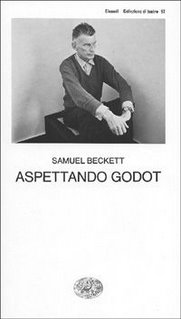
product: WAITING FOR GODOT
Made in: Samuel Beckett
"What are we doing here, that's what we need to ask . We are fortunate to know. Yes, in this immense confusion one thing is clear. We are waiting for Godot. "
The absurdity of Beckett only gives this to me, bewildered reader: the burden of a certainty that it is able to conceive only the most nightmarish and confusing questions. The certainty is that deluded man who is waiting, the absurd is the absence of expectation of a perennial perennial, and this is not a permanent absent any absent: the absent takes the form of the protagonist.
Godot is the key to the work, the permanent center of gravity, yet never comes.
Vladimir and Estragon, main physical work, while waiting and waiting will not result in what might be called normal life, but take up position on a plateau at the foot of a tree, where the meeting should take place no one knows how we do not know when. A terrifying scream coming from the wings to freeze the words of Didi and Gogo (the nicknames of the two), who gather in an embrace: two strange characters enter the scene, Pozzo and Lucky, in the roles of master and servant, arrogant, boastful, dictatorial, self-styled master of the land where the action takes place the first, the second most faithful and obedient, a loyalty, that of Lucky, which is strange: he obeys only a well, or better to obey only those who take advantage of his being servile, docile is with those who are evil, violent people who want to dry your tears, even thought he is a free act, is under the thumb of his role so as not to feel even humiliated in front of an order as: "Think, pig!"
Didi and Gogo's life flows like a bad dream, the events are unconnected, without a precise explanation - "nothing to do, "says Estragon, the first beat, after having vainly struggled to take off a shoe too tight. The speeches, alienated and alienating, they put me at ease.
Didi and Gogo are in solidarity with each other, suspicious of others, groups of people who self-protect basking, bored and tired of this waiting, without question, their survival, clinging to nothing. The character traits of the characters has their own marcatissimi and characterization refers to the excess they do not represent men, but for the most human types. Didi and Gogo
living death as a possible solution as a possible hobby - because what is important is to pass the time - and not just because they hang a rope strong enough to bind the tree.
Didi and Gogo are aware of their middle position to be in an endless limbo, I have become aware, but do not have the courage to admit that Godot will never come, do not have the courage to go forward, to redeem himself in secular terms.
Waiting for Godot seems to be the only hope, the last hope, the only reason to stay alive.
Beckett, reversing the game of good examples and teachers to follow, seems to give bad examples of life, Nietzsche seems to indirectly give us a lesson, but did not implement it by its characters, Didi and Gogo would go away, they would get from that 'plateau and do not be afraid of men waiting for them below, would admit that Godot will never come, that maybe they never got that appointment, they are wasting their time to keep up with the whims of Mr. Godot who does nothing to postpone the meeting, but fail to realize this will seem to expect the man in the Gaia Science came with a lantern to announce the death of their Godot, but he does not get crazy here.
Try to give a stimulus to men so that they can recover (Didi and Gogo will pop up after having fallen - "to want is power," they say)? Click
perhaps so that they continue to wait? What is the intent
Beckett?
Who or what people expect? Waiting for Godot
or someone you really wake up their conscience, announcing to them that it's time to find the truth in the faces of the men themselves, in the end of metaphysics?
Man, lost to himself, continues to wait in a desperate and failed hope, Godot.